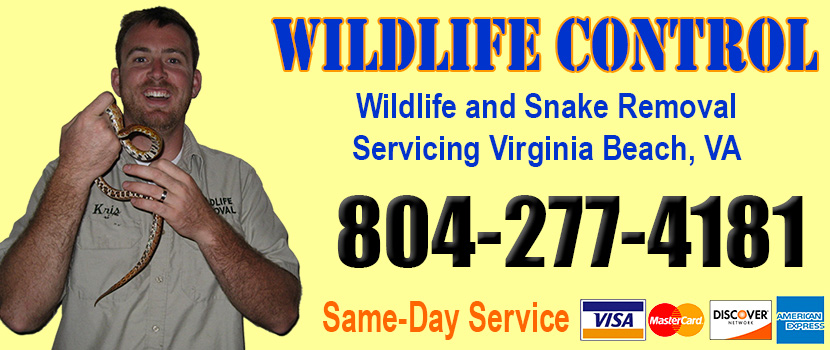
Welcome to virginiabeachsnakes.com! I am David, a snake enthusiast living in Virginia Beach, VA. Many people don't know that Virginia Beach is in fact full of snakes! You just need to know where to find them - they can often be shy and elusive. Some Virginia snake species are more common outside of the city limits, in different parts of Virginia Beach County VA, but many types of snakes are indeed common in the more urban parts of Virginia Beach. This guide is meant to help educate you about the beautiful snakes of Virginia Beach, and to help you identify the most common snakes of Virginia Beach, as well as the venomous snakes of Virginia Beach that you should learn to recognize and avoid. If you want more detail, click here for my complete list of ALL snake species in Virginia Beach. Remember the following:
- Most snakes of Virginia Beach are harmless and don't want to encounter you
- Venomous snakes exist but are uncommon in Virginia Beach, Virginia
- Snakes eat rats and mice and are a valuable part of the Virginia ecosystem
- Never kill a snake - if you leave a snake alone, it will leave you alone.
Common Snake Species in Virginia Beach
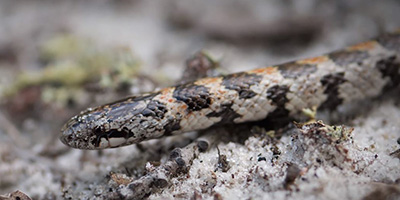 Eastern Kingsnake:
The eastern kingsnake as apparent from their name is quite huge with their average size ranging from 90 cm to 125 cm. Their bodies are quite shiny and have smooth scales. They have bands around their body that are chain-like and called "chain-link bands" that goes around the back of the snake and meet the snake's sides. Due to this physical feature the eastern kingsnake is also called the chain kingsnake. It is very common for these snakes to have a head that is short and stout and small eyes. It is not unusual for people to keep these snakes as pets even though they sometimes rattle their tails and release a musk.
Eastern Kingsnake:
The eastern kingsnake as apparent from their name is quite huge with their average size ranging from 90 cm to 125 cm. Their bodies are quite shiny and have smooth scales. They have bands around their body that are chain-like and called "chain-link bands" that goes around the back of the snake and meet the snake's sides. Due to this physical feature the eastern kingsnake is also called the chain kingsnake. It is very common for these snakes to have a head that is short and stout and small eyes. It is not unusual for people to keep these snakes as pets even though they sometimes rattle their tails and release a musk.
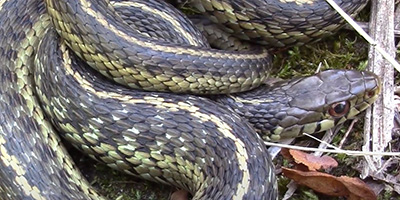 Eastern Garter Snake:
This snake has the scientific name Thamnophis sirtalis. These snakes are differentiated from other snakes based on the three bright yellow stripes running down their dark skin. Variation of color and pattern can lead to some snakes having a check like pattern on their grayish or reddish body featuring stripes of a lighter color. Eastern garter snakes can be found in many parts of America, however, the ones found near Virginia Beach usually have a blue-colored body. The belly of this snake is light-colored that is either white or yellow depending on the snake. Female eastern garter snakes usually have shorter and thinner tails as compared to their male counterparts.
Eastern Garter Snake:
This snake has the scientific name Thamnophis sirtalis. These snakes are differentiated from other snakes based on the three bright yellow stripes running down their dark skin. Variation of color and pattern can lead to some snakes having a check like pattern on their grayish or reddish body featuring stripes of a lighter color. Eastern garter snakes can be found in many parts of America, however, the ones found near Virginia Beach usually have a blue-colored body. The belly of this snake is light-colored that is either white or yellow depending on the snake. Female eastern garter snakes usually have shorter and thinner tails as compared to their male counterparts.
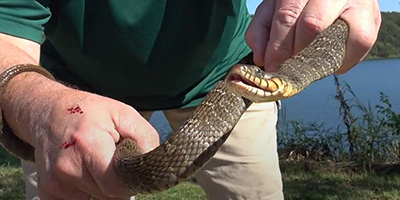 Plain-bellied Water Snake:
The plain-bellied water snake varies between 2-4 ft., the maximum size being 6 ft. The back of the plain-bellied snake is usually varying between shades of green and gray to dark brown and red. The belly of this snake is a bright orange/red color without any marks. Younger plain-bellied water snakes are gray-brown and have dark bands across their bodies; the younger snakes are often confused with the banded water snake. There are keels in the snake's scales. Water snakes are often confused with other snakes such as cottonmouth snakes but there are keen differences such as the cottonmouth has thicker skin and unlike the water snake's pupils, they are not round.
Plain-bellied Water Snake:
The plain-bellied water snake varies between 2-4 ft., the maximum size being 6 ft. The back of the plain-bellied snake is usually varying between shades of green and gray to dark brown and red. The belly of this snake is a bright orange/red color without any marks. Younger plain-bellied water snakes are gray-brown and have dark bands across their bodies; the younger snakes are often confused with the banded water snake. There are keels in the snake's scales. Water snakes are often confused with other snakes such as cottonmouth snakes but there are keen differences such as the cottonmouth has thicker skin and unlike the water snake's pupils, they are not round.
Venomous Snake Species in Virginia Beach
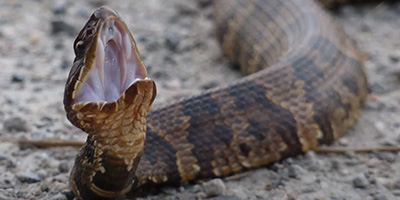 Northern Cottonmouth:
Interestingly enough, the northern cottonmouth is a semiaquatic snake; these snakes are also called water moccasins. Their heads are triangular and quite large. There is a dark line running down the snake's eye. The venom glands in the snake make their jowls large and prominent. The size of a northern cottonmouth varies from 60-122 cm and they have heavily scaled bodies. The color of their bodies varies as well and is not limited to one color or pattern. Northern cottonmouths can have entirely pure black or brown bodies or yellow or brown colored skin with crossbands across their body which are usually very dark. These snakes have a facial sensing pit as well which not only protects them against predators but senses heat.
Northern Cottonmouth:
Interestingly enough, the northern cottonmouth is a semiaquatic snake; these snakes are also called water moccasins. Their heads are triangular and quite large. There is a dark line running down the snake's eye. The venom glands in the snake make their jowls large and prominent. The size of a northern cottonmouth varies from 60-122 cm and they have heavily scaled bodies. The color of their bodies varies as well and is not limited to one color or pattern. Northern cottonmouths can have entirely pure black or brown bodies or yellow or brown colored skin with crossbands across their body which are usually very dark. These snakes have a facial sensing pit as well which not only protects them against predators but senses heat.
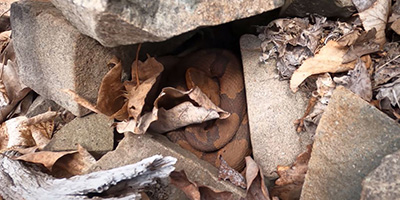 Eastern Copperhead:
These snakes are usually identified through the crossbands that run along their body. These crossbands are dark-colored and may take a shape of an hourglass. The crossbands vary from one snake to another and sometimes the crossbands are broken which results in it not being connected. They also have vertical pupils. Now, this snake is a pit-viper. Eastern copperheads have a pit on their heads located between their eyes and nostrils. This is a pit that senses heat and is often used to distinguish Virginia's venomous snakes from the harmless ones. One such other characteristic that sets these venomous snakes apart is a row of scales present underneath the tail.
Eastern Copperhead:
These snakes are usually identified through the crossbands that run along their body. These crossbands are dark-colored and may take a shape of an hourglass. The crossbands vary from one snake to another and sometimes the crossbands are broken which results in it not being connected. They also have vertical pupils. Now, this snake is a pit-viper. Eastern copperheads have a pit on their heads located between their eyes and nostrils. This is a pit that senses heat and is often used to distinguish Virginia's venomous snakes from the harmless ones. One such other characteristic that sets these venomous snakes apart is a row of scales present underneath the tail.
If you're unsure, you can email me a photo of the snake at info@virginiabeachsnakes.com and I will email you back with the snake's species. If you found a snake skin, read my Found a Skin? page, and you can email me a photo of the skin, and I'll identify the snake for you. If you need professional Virginia Beach snake removal help, click my Get Help page, or see the below website sponsor I found, who provides that service.
Understanding The Water Moccasin Snake: Appearance, Biology, Life Cycle, Habitat, Diet, Behavior
About the Water Moccasin
The water moccasin is a somewhat common snake, and America’s only venomous water snake. It also goes by the name cottonmouth and is a type of pit viper, with a dangerous bite if it so happens to get to you. If you are ever around one of these, it is important you understand them. You want to know about them to keep yourself safe and to understand what makes them, them. Whether it is out of curiosity or because of necessity, this is valuable information to have. Though they are not a dangerous type of snake, when it comes to likelihood of them actually biting, you still want to know as much about them as possible.
Appearance
Water moccasins are long, blackish snakes. They are a dark color across the majority of their body, with some white around their mouth. That white is what gives them the name cottonmouth. These snakes can grow, at most, about 6 feet. They are thick, as well. They remain a large and fearsome snake, even down to how they look.
Life
Every few years, during spring, water moccasins will mate and give birth. Gestation takes a few months and the mother births a little of live snakes. The live snakes incubated in eggs inside of the mother, instead of having the mother lay the eggs directly, like many other types of snakes do. Parents do not care for their young, as is common for snakes. Once they are born, they do as they please.
Behavior
Though their bite is dangerous, water moccasins rarely attack humans. Unless they feel there is a threat to their life, they are going to prefer distance over attack. This does not mean they run away. Water moccasins will stand their ground if humans are around, so make sure to keep your distance from them.
Habitat
As they are semi-aquatic, you can find these snakes near bodies of water. Swamps, lakes, streams, and other aquatic locations are perfect for them. They prefer to be near water, living largely in branches and hanging around on the edge of water.
Diet
The diet of the water moccasin is primarily fish, rodents, birds, eggs, and other small prey. They use their venom to capture and kill, and then consume, the prey. Water moccasins may come with risks, but they largely want to stay by themselves. They prefer to hang out on branches and around water rather than dealing with humans.
Remember, the term is not poisonous snakes of Virginia Beach, it's venomous snakes of Virginia Beach. Poison is generally something you eat, and venom is injected into you. That said, dangerous snakes are very rare in Virginia Beach. The few venomous snakes of Virginia Beach County are rarely seen. But they are commonly misidentified, so learn about all the snake species of Virginia Beach in order to correctly identify them. These snakes are usually also found in the surrounding towns of Bay Island, Bayside, Chic's Beach, Norfolk, Dam Neck, Princess Anne, and the surrounding areas.
Read our article about:
Can I trap a snake myself or should I call a professional?
virginiabeachsnakes.com domain and hosting costs made possible by the generous support of this sponsor:
